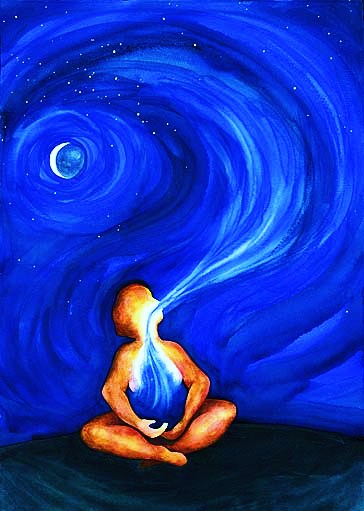FWP:
SETS == HERE/THERE
Like the previous verse, {167,8}, this one rests on a sort of semantic meaning-play and wordplay between two senses of the verb khichnaa (or khi;Nchnaa ), the intransitive of khe;Nchnaa , 'to draw'. One 'draws' a breath; fortunately we have the same idiom in English. But in Urdu one can also easily and colloquially 'draw', or 'draw out', a lament: utter it, sigh it, heave it, prolong it, drag it forth, etc.
And just as in the previous verse, it's up to us to make this connection: the verse gives us naalah khichnaa , and we ourselves pair it with dam khichnaa , and recognize the enjoyable subtleties thus created. In the wake of this equation come many other implications adduced by the commentators: that our every breath is a sigh, and so on.
There's also the elegant and suggestive affinity between dam and ((adam .
Note for grammar fans: Nazm's argument is petulant rather than persuasive. Ghalib's use of so in this verse cannot, and does not, prove that he considers it an indispensable complement to jo . {12,2} and {20,9} are only two of the many verses that use jo but not so . In fact, the majority of jo verses do not use so . Nazm must have gotten up on the wrong side of the bed (as my mother used to say) the day he wrote this commentary.

Nazm:
That is, to perform some laments had already been decreed for us from eternity. We were not able to 'draw' them there; having come here, we are drawing those very laments, and the coming and going of the breath is that very lament-drawing. From this verse it is also learned that as with Nasikh, in the author's language in response to jo it is necessary that there be a so . If you remove the so from the line, and instead of yaa;N read yahaa;N , the line remains metrical. And the author's rank is great-- the person who has practice [mashq] in the versifying of words, when he thinks about composing, such matters do not remain hidden from him.
Then though both forms are proper, in fact vahaa;N is more correct than vaa;N , and yahaa;N than yaa;N . If the author had rejected so , then there would also have been the advantage that in place of yaa;N , there could have been yahaa;N . But in order to bring in so , he chose to accept yaa;N as well. And the structure gives testimony that this action is deliberate. In this verse dam hu))e is not good, but the theme of the verse is extremely refined/subtle [la:tiif]. (186-87)
== Nazm page 186; Nazm page 187